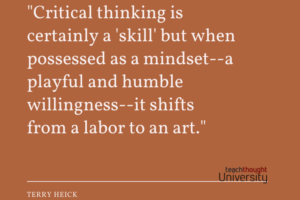
Report Shows Rising Unemployment and Layoffs for B.A. Grads
Fifty-two percent of the Class of 2023 was underemployed a year after graduating, the Burning Glass Institute reported.
Photo illustration by Justin Morrison/Inside Higher Ed | Jacob Wackerhausen and Tomwang112/iStock/Getty Images | Michael S. Williamson/The Washington Post/Getty Images
For the first time, unemployment rates for young recent graduates are rising faster than for those without a college degree. At the same time, recent graduates are facing extremely high rates of underemployment, according to a new report from the Burning Glass Institute, a workforce think tank.
The report, titled “No Country for Young Grads,” paints a bleak picture of the employment landscape for young bachelor’s degree holders in the aftermath of the COVID-19 pandemic and amid the rise of artificial intelligence.
More than half of the Class of 2023—52 percent—worked in a job that did not require a bachelor’s degree one year out from college. Meanwhile, unemployment rates for young degree holders—those ages 20 to 24—rose a percentage point from the late 2010s to now. Over the same period, unemployment held about steady for high school graduates who never attended college and associate degree holders in academic degree programs, while it decreased for those with occupational associate degrees.
Layoffs, too, are hitting young workers harder than ever; the layoff rate for young degree holders has nearly doubled from pre-pandemic levels.
These changes don’t correlate with a larger economic downturn as similar unemployment trends among young people often did in the past, said Matt Sigelman, president of the Burning Glass Institute and one of the report’s authors.
“Some of the sectors that have been creating the most opportunity for graduates [in the past] are actually still doing well—they’ve just stopped hiring or they’ve stopped hiring as much, and when they are hiring they’re less likely to be hiring new entries to the workforce as opposed to people with experience,” he said.
There are several likely reasons for this, according to the report. For one, more companies are now relying on AI to complete tasks that recent graduates have historically done. Companies are also becoming less interested in training and investing in entry-level workers, preferring to maintain a smaller but more experienced team—a trend that Sigelman said dates back to the pandemic, when many company leaders realized they could still function well with fewer employees.
Such shifts are reflected in the declining number of job listings for roles that require fewer than three years of experience, according to the report.
How Colleges Can Help
Shawn VanDerziel, president and CEO of the National Association of Colleges and Employers, said in an email to Inside Higher Ed that the report’s findings were “significant” and indicate that employers may be overlooking the value of hiring interns and recent graduates.
“Companies that offer internships receive a valuable return,” he said. “Not only do they help train the next generation in critical skills, but they also benefit by converting interns into full-time employees who tend to stay longer. This is a powerful advantage.”
The solution seems to be ensuring students have more expertise “out of the gate,” Sigelman said.
“You’re going to need to be able to start your career in the middle as opposed to the beginning. You’re going to need to be able to do at 22 or 24 or 27 what you used to come to do by the time you were 30 or 35,” he said. “It makes it more incumbent on undergraduate institutions to rethink their curricula to make sure that they are helping students acquire deeper proficiency in critical skills.”
Kysha Wright-Frazier, president and CEO of the Corporation for a Skilled Workforce, a workforce policy nonprofit, said that colleges must prioritize helping their students access work-based learning opportunities as early in their undergraduate careers as possible. If students begin completing internships as soon as their first year of college, they may be more likely to qualify for a position that asks for three years of experience after graduation.
At the same time, Melissa Goldberg, CSW’s director of competencies and credentials, noted that model only works if there are enough paid work-based learning opportunities to go around.
“Sure, employers provide internships sometimes and engage in apprenticeships sometimes, but I really feel like this needs to be part and parcel about how our labor market works,” she said.
The situation is likely to get worse for recent graduates before it gets better. Gad Levanon, the report’s lead author, said employers have just scratched the surface of replacing entry-level employees with artificial intelligence; as new AI platforms and technologies continue to emerge and improve over the coming years, he said, it’s likely more fields will embrace the use of such tools in place of less experienced workers. The number of individuals getting bachelor’s degrees is also increasing, the report notes, meaning even more young people will be competing for a decreasing pool of entry-level jobs.
VanDerziel stressed that as the job market becomes increasingly challenging and competitive for young bachelor’s degree holders, universities must invest in career services to ensure their students have the best resources available.
“Career services are also crucial to students’ long-term success. These departments provide institutions with insights into evolving industry needs and help students develop a broader understanding of their transferable skills—enabling them to adapt when certain sectors or job families slow down. Investing in students’ career readiness is simply smart business, and it is increasingly urgent,” he said. “The world of work is changing, and higher education must evolve alongside it.”
Source link



